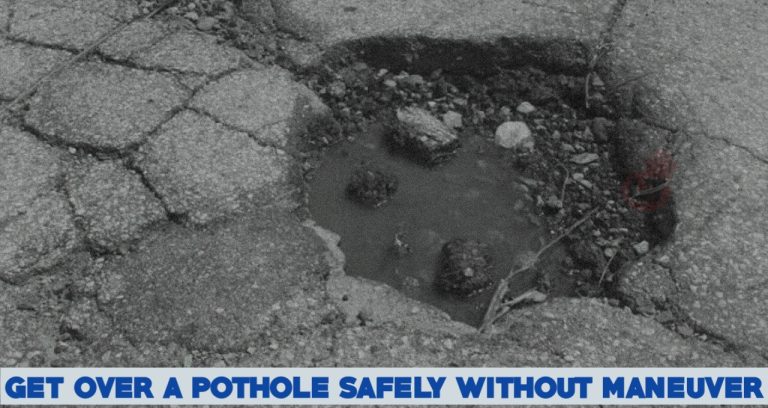Potholes can be a major hazard for drivers, causing damage to vehicles and potentially leading to accidents.
If you can’t safely maneuver around a pothole, it’s important to know the proper steps to take to get through it without causing damage to your car or putting yourself in danger.
Although, in a case where damages can’t be bypassed, it’s also important to know how to make the damages minimal.
In this article, we’ll see the possible ways to get over a pothole safely when you can’t maneuver it.
Getting Over Potholes with Minimal Car Damage
It’s often advised to avoid potholes to prevent accidents of loss of control, but in most cases, they come at you very fast.
Here are some techniques you can employ that’ll help you drive over potholes safely.
1. Slow down and enter it gently
If you’re driving at a reasonable speed and notice a pothole on the highway, downshift to a lower gear before you hit the pothole.
Meanwhile, drivers with automatic transmission vehicles should gently tap the brakes before hitting a pothole.
This will help to help you coast/Glide over the pothole, thereby reducing the impact and preventing damage to your vehicle.
2. Don’t Apply the Brakes
If you’re driving at a very high speed of, let’s say, 80 to 100km/hr, then it’s advised that you jump over the potholes without depressing the brakes.
This is usually because applying brakes at this point will make the vehicle hit the pothole even harder, resulting in accidents or wheel suspension damage.
While the jump might also result in minor damages, it can’t be compared to the one that’ll happen if you hit a pothole with that impact.
3. Hold the steering wheel firmly
Make sure you have a good grip on the steering wheel before you hit a pothole. This will help you to maintain control of your vehicle and prevent it from going astray.
4. Drive Slowly
Driving slowly in an unfamiliar area or place known for potholes can help you maneuver them on time.
This is advisable, especially when driving at night because impact with potholes seems more frequent now.
It’s also important to slow down because it gives you more time to react to the pothole and make any necessary adjustments.
5. Face it Straightforward
Another tip to help you maneuver potholes with less impact is to avoid hitting the hole at an angle.
Avoid swerving in panic when you notice potholes; face them squarely, as this will reduce the damage and eliminate the risk of collision.
6. Don’t brake after you hit the pothole
If you brake after you hit the pothole, it can cause your vehicle to become unstable and potentially lead to an accident.
Instead, continue driving at a reduced speed until you pass the pothole.
7. Properly Inflate Tires
Underinflated or overinflated tires aren’t good for handling potholes as they’ll further worsen the impact.
Improper tires will either make the car bounce off the track or inflict more damage to the wheel and suspension.
You must check for over or under-inflated tires, worn-out tires, and tires with side wall bubbles and replace them.
8. Report to the appropriate authorities
If you see a pothole on the road, report it to the appropriate authorities. This will help to repair the pothole and prevent it from causing issues for other drivers.
That’s all.
How to safely avoid Potholes
Here are some guides you can put into practice while driving to avoid potholes safely.
1. Concentrate
Most drivers often drive with their attention divided, thus exposing them to pothole impacts.
Concentrating will help you notice and avoid potholes in time without maneuvering around them.
2. Drive Carefully
This involves increasing the distance between you and the car in front. This will help you prevent potholes if the vehicle in front does.
Also, avoid overtaking a car without a clear view of the highway; you might run into a pothole trap.
3. Increase your visibility
While driving at night, it’s advised that you drive slowly with the headlights on and the windshield free of dirt, moisture, or dust.
This will increase your visibility and help you see potholes on your track.
4. Look for alternative routes
If possible, try to avoid potholes by taking a different route. This is especially important when driving a low-clearance vehicle or transporting a fragile product.
5. Maintain your tires and suspension
The health of your tires and suspension also plays an important role in how much damage the pothole impact will cause.
So, ensure your tires are properly inflated and your suspension checked to help keep your shock, springs, and struts intact.
Pothole-related Damages
Here are some damages that will likely occur to your car if you don’t know how to avoid or maneuver a pothole.
- Tire leaks and damage
- Wheel misalignment
- Unbalanced car
- Steering and suspension damage
- Tire sidewall bubbles/Bulge
- Strange Noises from the car.
Regardless of these signs, if you feel your car isn’t working as it used to after a pothole impact, you should visit a mechanic.
FAQs
Conclusion
It is essential to take the necessary precautions to get over a pothole safely if you can’t maneuver around it.
Slow down, stay alert, and use your brakes to reduce the impact. Hold the steering wheel firmly and avoid braking after you hit the pothole.
As an Amazon Service LLC Program Associate, V. Auto Basics earns from qualifying purchases. See Our Affiliate disclaimer.
